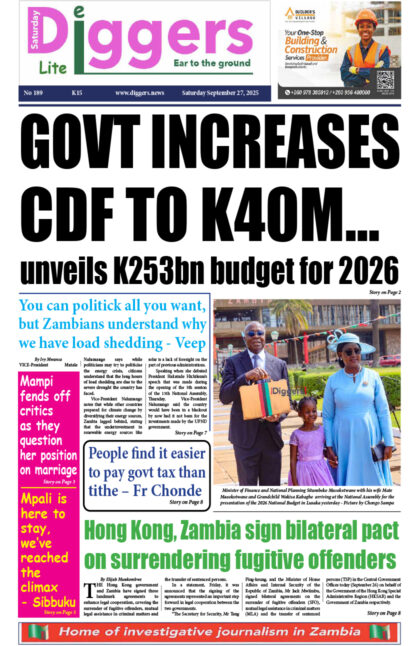Police Spokesperson Esther Katongo says officers are not happy with the retiring of four of their colleagues in Sesheke, fearing that it could happen to any of them at any time.
And Katongo has lamented that cadres have no respect for the police, suggesting that the service would operate much more effectively as a force.
Speaking when she featured on UNZA Radio’s Lusaka Star Program, Monday, Katongo also refuted social media reports that the police had apologised to the PF for having beaten the party’s cadres in Sesheke.
Katongo said two of the retired officers were her personal friends and no one in the service was pleased about what had happened to them.
“No one would want to see a fellow Police Officer being retired, I have seen a lot of statements, some of them attributed to me, propaganda on Social Media to say I have even been counting that now we have fired four, there are 14 more to be fired, which is not true. No one would want to see a police officer being fired because what happens to my fellow officer today, may happen to me tomorrow. So we live as a family and when one goes like that, we really feel bad. And speaking in my personal capacity as Esther Katongo, two of the four officer who were retired, are my personal friends whom I have worked closely and I feel bad. I will talk about Shapa Wakunguma, I will talk about Chilongo, those are officers that we have been interacting with very well and to see that they have been retired is not something that has made us happy, even as a service we are not happy that our friends have been retired like that,” Katongo said.
“I saw the propaganda online stating that the Zambia Police Service had apologised to the PF for allegedly beating its cadres. At no point did I ever write to the SG that the service had apologised for what transpired. In fact, it is not within my mandate to write such letters on behalf of the institution, I am not the person in charge of the police, there is the command there. I was puzzled to read that and that’s the propaganda I am talking about.”
And Katongo said political party cadres had no respect for the police as some cadres even go to an extent of causing fights at police stations.
“There are situations where cadres want to go and cause a fight at the police station, meaning that they do not respect the police. Maybe in the past when we were a police force, people had so much respect and fear for the police now with the police service, when you handle someone, the human rights people will come in and all these NGOs crying out loud against the police. I think those who created the police as a force they knew why they did that. I think this issue of it being a service is somehow disadvantaging the operations of the police. People should have respect for the Police, especially the cadres. Cadres do not have respect for the police, the police are here to serve everyone in maintaining law and order,” Katongo said.
Meanwhile, Katongo said the PF cadres who went to protest at Parliament last week did not have a permit but they were not arrested because they complied when officers asked them to disperse.
“We heard complaints from people saying ‘when did they apply?’ even without understanding what transpired. No one gave those PF cadres any permit to go to Parliament to go and protest, it was just a group that mobilized itself to go and protest. And immediately word reached the Police, the Police commissioner Lusaka Division had to deploy officers to go to Parliament. And I heard people saying there was no any arrest. That’s not how we operate, we don’t just go and start arresting people, we first approach them and find out what they are up to. If they fail to comply, that’s when we use minimum force. But when it came to this group that was protesting outside parliament, immediately the officers engaged them and told them to disperse, they complied. So if they complied, why should we use force? But when you look at people are looking at the situation, they want it to look like we used kids gloves because they are PF cadres, no,” Katongo said.
She said police did not see anything wrong with the Public Order Act.
“There was a time when the issue of the Public Order Act was in court and at that time it was Dr Solomon Jere who was appearing in court where we were looking at the Public Order Act. After analyzing it, to us as the police it is very useful piece of legislation and we feel it is sufficient. We have never complained against the Public Order Act and its provisions, we have been receiving complaints from people that are being policed. So when it comes to amending the Public Order Act, let those who are being policed, the ones who are seeing the gaps, go and make their submissions to Ministry of Justice. We however don’t want them to end up with a piece of legislation that would be useless, we would want to have a legislation that would help the police to police the public because if this can’t be done, anyone can wake up today, get a chair to go and sit in the middle of the road because there will be no one to step that person or anyone would just wake up and say I will be having a meeting tomorrow and no one will question them, that will mean chaos,” Katongo said.
Meanwhile, Katongo said the Police were not segragative in the application of the Public Order Act
“I would say the Police is not segregative in the way we implement the Public Order Act. What regulating officers do is that they will look at the situation before giving a go ahead to groupings that intend to hold public meetings. However, whenever we have told some groupings that you cannot go ahead because of this, we see them going to the media, making a lot of noise, saying the police have not allowed us but in an event when you allow them, there will be no noise. So those who have been complaining, they should be honest with their complaints. If the police were just saying go ahead, go ahead, there could have been no need to have a provision in the Public Order Act stating that the Police must give a go ahead. So if we say you are not going ahead, we are just doing our job according to our assessment and the law is very clear, if you are not happy, you can write to the minister of Home Affairs and later to the courts,” said Katongo.
“Our role when it comes to elections is to ensure that we create an environment where every political party and individuals feel protected to participate freely. And an environment where all participants are given a common ground where they can conduct campaigns freely and to ensure that we protect the election materials.”
























